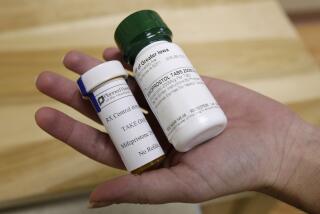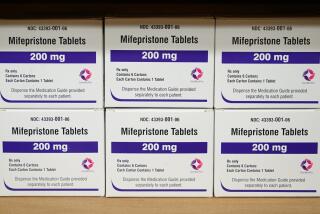Court Asked to Rule on Drug Makers’ Liability
- Share via
SAN FRANCISCO — The California Supreme Court has been asked to rule that prescription drug manufacturers can be held strictly liable for defective products--a ruling that would ease the way for people claiming injury to win damages at trial.
Lawyers for plaintiffs in 69 lawsuits involving the now-banned drug DES contended in oral argument Friday before the justices that manufacturers should be held financially accountable even without showing that they were negligent in marketing the drug decades ago.
“The fact is the consumer needs that kind of protection,” LeRoy Hersh, a San Francisco attorney, told the court. “The consumer is powerless.”
Defendants’ Position
A lawyer for one of the defendants in the massive case argued that consumers already are well-protected by governmental and industry testing and safety standards, as well as the physicians who later prescribe the drugs.
Imposing strict liability would raise costs, discourage research and development and drive manufacturers out of the industry--all to the detriment of consumers, said Peter W. Davis, an Oakland attorney representing Eli Lilly Co.
“The imposition of strict liability on prescription drugs would do more harm than good,” he said.
The case before the court represents a major test of the doctrine of strict liability--or liability without fault--which has been applied widely by the courts in recent years in cases involving products ranging from lawn mowers to perfume. The state Supreme Court first recognized the doctrine in a 1963 case involving a home power tool.
Burden Shifted
Under this theory, the manufacturer, rather than the buyer, bears the cost when the product proves defective and causes injury. Thus the burden is shifted away from innocent consumers who suffer harm--and manufacturers are encouraged to make their products as safe as possible. To win a suit, plaintiffs need only prove that a product was defective, not that the manufacturer was careless or negligent.
The 69 personal injury suits were brought in San Francisco Superior Court against 170 drug companies that manufactured or distributed DES, or diethylstilbestrol, an anti-miscarriage drug prescribed between 1947 and 1971 that is now suspected of causing vaginal and cervical cancer in the daughters of some women who took the drug. An estimated 800 DES cases are pending throughout the country.
In June, 1986, a state Court of Appeal in San Francisco, ruling on pretrial issues in the case, held that the manufacturers could not be held strictly liable for “design defects” in the drug.
Prescription drugs, unlike other products, are “unavoidably unsafe” but their inherent risks are reasonable because they also provide many benefits, the appeal court said. In such instances, defendants can be held liable only for failing to warn of any defects they knew of or should have known of when the drug was marketed, it said.
Liability Standards
In Friday’s arguments, Hersh, representing the plaintiffs, told the court that there was no reason why prescription drugs should not be subject to the same liability standards as other products.
He drew support from Gerald C. Sterns, a San Francisco lawyer representing the California Trial Lawyers Assn. as a “friend of the court” in the case.
“A manufacturer who places a product on the market stands by that product--and if it proves to have a defect, the manufacturer should be held responsible,” Sterns said. “The question is who should be at risk. Should it be the random victim or the industry?”
Davis, arguing for the defendants, said that when prescription drugs are sold, they “meet every standard” of testing, safety and labeling that scientific knowledge permits at that time. The federal Food and Drug Administration and independent physicians assist in protecting the purchasers of prescription drugs, he said.
Can Sue for Negligence
The attorney, responding to questions by Justice Stanley Mosk, noted that even if they are denied the ability to sue under strict-liability rules, plaintiffs can still bring suit for negligence if they believe that drug companies acted unreasonably in providing a product that proves defective.
“This is not a powerless consumer,” Davis said. “Strict liability is not necessary to ensure the safety of drugs.”
Justice Allen E. Broussard expressed concern over whether the FDA, an agency “operating in the political arena,” could adequately protect the safety of consumers.
Davis responded that the FDA was not “as political” as might be thought, and that the agency has drawn less criticism for allowing prescription drugs to be sold than it has for refusing to permit them on the market.
A decision in the case is expected by early next year.
More to Read
Inside the business of entertainment
The Wide Shot brings you news, analysis and insights on everything from streaming wars to production — and what it all means for the future.
You may occasionally receive promotional content from the Los Angeles Times.










